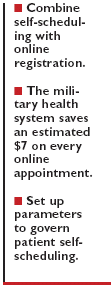Article
Let patients book their own appointments?
Technology Consult
Internist Scott Yates at North Texas Medical Group in Plano figures that since he can book airline flights on the Internet, his patients should be able to use it to book appointments with him.

Real-time scheduling gives patients peace of mind as well as convenience. Consider the feverish child who's up on and off all night. If the parent can book a visit at midnight for 10:00 a.m., what little sleep she scores will be more restful.
Appointment programs offer safeguards
Despite the benefits, doctors who let patients write themselves into the schedule are few in number, says healthcare IT consultant Mark Anderson, CEO of the AC Group in Montgomery, TX. Several major vendors of practice management and EHR software offer this technology, but customers generally don't turn it on, he says. "They're afraid patients will misuse the system."
But, doctors who've tried out the technology report little if any trouble. "Almost nobody abuses it because they would hate to be thrown back into the phone system," says internist Jeffrey Friedman, co-founder of 34-physician Murray Hill Medical Group in New York City. There, between 25 and 50 percent of appointments a day are scheduled online using a program from a company called NexSched, which Friedman helped launch.
One reason for the smooth sailing is that NexSched ( http://www.nexsched.com) and similar programs like Eppointments from EppointmentsPlus ( http://www.eppointmentsplus.com) keep doctors in control. They allow them to block out as many slots online as needed for walk-ins and patients using the phone. To prevent HIPAA violations, patients see only empty slots, not the names of people already scheduled. Slots are categorized by visit type such as new problem, nonurgent, well-woman exam, and annual physical, with each type assigned a time length. You can exclude office procedures from your menu to prevent people from booking, say, their own stress tests. These programs also let you limit how far in advance somebody can make an appointment.
Online scheduling has also made promising inroads at Tricare, the healthcare program for the Department of Defense and 9.2 million beneficiaries. Tricare introduced the service at military health facilities in 2001. While less than 1 percent of all appointments are booked online, that figure hovers around 20 percent at individual facilities that actively market the service, says John McCafferty, a flight surgeon at Vance Air Force Base in Enid, OK, who's helping implement the technology. Patients quickly master the system, he notes, and end up with the wrong appointment type no more often than if they'd phoned in.
There's a lot to like about online scheduling besides higher patient satisfaction, says McCafferty. He estimates that each do-it-yourself appointment saves Tricare $7 in staff time. The no-show rate is 2 percent, compared to 8 percent for over-the-phone appointments. Self-schedulers also are more truthful when they explain why they're coming in.
Internist Scott Yates, who uses NexSched, says online scheduling gives his staffers more time to talk on the phone with patients who require "live" assistance.





